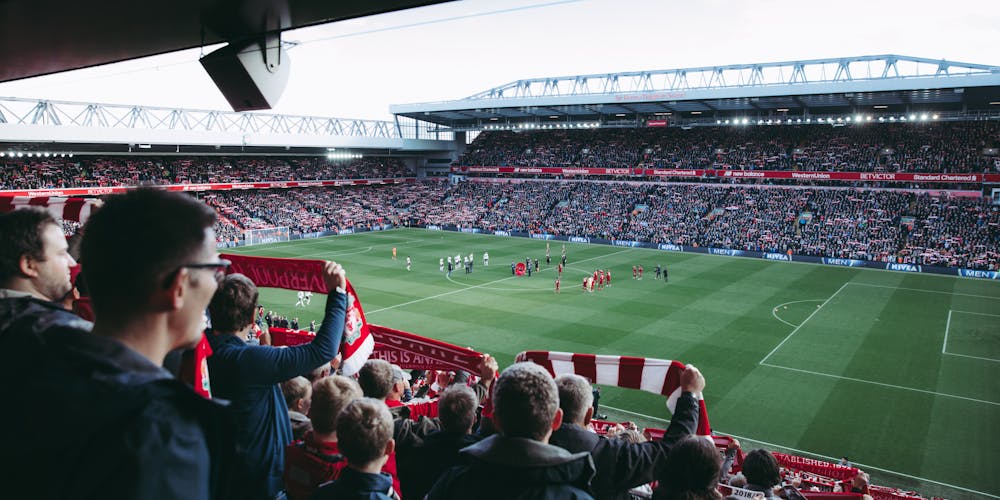sv88
₫6.775.220
Tham gia sv88 | hôm nay nhận ngay 99k tiền thưởng và thưởng thức dịch vụ nạp rút tiền nhanh chóng an toàn. Đừng bỏ lỡ các khuyến mãi độc quyền!
Product description
- Examining the historical home record of a team, including their win-loss-draw ratio, can provide insights into the extent of their home advantage.
- Considering the average attendance and the atmosphere generated by the home fans can offer clues about the potential impact on the players' motivation and energy levels.
- Evaluating the ability of the home team to capitalize on the crowd's energy and translate it into on-field success can further enhance the understanding of the home advantage factor.
Accounting for Venue-Specific Factors
The physical characteristics of the home stadium, such as the playing surface, dimensions, and environmental conditions, can also play a role in shaping the odds of a match. Teams that are familiar with the unique features of their home ground may have an advantage in adapting their tactics and exploiting the venue's peculiarities.
Tactical Strategies and Matchups: Unveiling the Game Plan
Tactical strategies and matchups between teams play a pivotal role in determining the outcome of a soccer match. Analyzing teams' playing styles, formations, and tactical approaches can offer insights into their strengths, weaknesses, and potential game plans.
: Identifying critical matchups, such as duels between top strikers and defenders or playmakers in midfield, can shed light on which team may hold the upper hand in pivotal moments.
By dissecting teams' tactical strategies, individual matchups, and game plans, bettors can gain a deeper understanding of the intricacies of a match and make more nuanced predictions about the potential outcomes.
Historical Performance: Past Results as a Guiding Light

Historical Performance: Past Results as a Guiding Light

Identifying Crucial Player Absences
The absence of star players or influential figures within a team can have far-reaching consequences on the team's performance and the associated odds. Factors such as the player's position, role, and overall contribution to the team's success must be carefully considered.
The momentum and form of a team can be a decisive factor in determining the outcome of a soccer match. Teams on a winning streak tend to carry confidence and momentum into their next game, while those struggling for form may face challenges in securing a positive result.
: Understanding teams' preferred playing styles, whether possession-based, counter-attacking, or high-pressing, can inform predictions about their approach in a particular matchup.
- Examining the contrasting playing styles, such as possession-based vs. counter-attacking, or high-pressing vs. defensive solidity, can reveal the potential tactical battlegrounds.
- Considering the specific strengths and weaknesses of each team in relation to their opponents' approach can provide clues about the potential for exploitation or neutralization.
- Analyzing the historical performances and outcomes of previous encounters between teams with similar stylistic matchups can offer insights into the potential patterns and outcomes.
Addressing the Impact of Managerial Decisions
The role of the manager, or head coach, cannot be underestimated when it comes to the tactical aspects of a soccer match. The manager's choice of lineup, substitutions, in-game adjustments, and overall strategic approach can have a significant impact on the odds of a match's outcome.
: Incorporating quantitative analysis, Bayesian inference, and expected value calculations into the betting strategy can help assess risk, optimize returns, and make strategic bets based on mathematical principles.By staying abreast of the latest betting market trends, understanding the influences of public sentiment and market psychology, and leveraging statistical models and data analytics, bettors can navigate the complexities of the soccer betting landscape, identify potential opportunities, and make more informed and strategic decisions when wagering on matches.
- Evaluating how strong winds can affect the trajectory of long passes, shots on goal, and set-piece deliveries can offer insights into the teams' ability to adjust their playing style and tactics accordingly.
- Considering the impact of high humidity levels on player endurance, recovery rates, and overall performance can provide clues about the teams' fitness levels and their ability to maintain intensity throughout the match.
- Analyzing historical data on matches played in windy or humid conditions can reveal patterns and tendencies that shed light on certain teams' proficiency in handling these environmental challenges.
By taking into account the various elements of weather conditions, including temperature, precipitation, wind, and humidity, soccer enthusiasts and bettors can gain a more nuanced understanding of how these factors can influence the odds of a match and potentially sway the outcome in unexpected ways.
: Consideration of the distance traveled, time zones crossed, and the impact of travel fatigue on away teams can provide insights into their readiness and preparedness for the match.
Analyzing the significance of home advantage and its impact on teams' performance can help bettors assess the likelihood of a home team's success and factor it into their betting strategy.
- Playing Styles: Sudden shifts in odds or large volumes of bets placed on a specific outcome can indicate important information or developments that may impact the game.
- Reasons Behind Changes
Analyzing the Impact of Crowd Support
The energy and enthusiasm of a team's home crowd can provide a palpable boost to the players' morale, confidence, and performance. The roar of the fans, the collective chanting, and the sense of unity can create an electric atmosphere that can be intimidating for the visiting team.
: The psychological impact of successive wins or losses on players' morale, motivation, and mindset can influence their performance on the pitch.
Assessing teams' form, momentum, and psychological state can provide valuable insights for bettors looking to capitalize on teams' streaks or anticipate potential upsets based on fluctuations in form.
Tracking Line Movements and Odds Shifts
Monitoring the movement of betting lines and odds fluctuations across different bookmakers can offer insights into the changing sentiments and perceptions of bettors regarding the potential outcomes of a match.
When it comes to predicting soccer odds, historical performance is undoubtedly one of the most crucial factors to consider. The past results of teams and players can provide valuable insights into their current form, strengths, and weaknesses, offering a starting point for assessing potential outcomes.
: Playing at familiar surroundings, with knowledge of the pitch dimensions, surface quality, and environmental conditions, can benefit the home team's performance.
In this comprehensive blog post, we will delve into the various factors that shape the perception and assessment of soccer odds. From historical performance to team form, player injuries, home advantage, tactical strategies, and market trends, we will explore how each of these elements can impact the outcome of a match and the corresponding odds. By understanding these influential factors, soccer enthusiasts and bettors can make more informed decisions and gain an edge in the ever-changing landscape of the sport.
Historical performance serves as a valuable guide in predicting future outcomes in soccer matches. By analyzing teams' past results, head-to-head records, and performance trends, bettors can gain insights into teams' strengths, weaknesses, and overall form.
- Assessing the quality and experience of a team's backup players and their ability to step up in the absence of key figures can provide insights into the team's overall resilience.
- Evaluating the team's tactical flexibility and the interchangeability of players within different positions can reveal their capacity to adapt to changing circumstances.
- Considering the team's track record in successfully navigating through injury crises can offer valuable insights into their problem-solving abilities and the overall resilience of the squad.
By closely monitoring player availability, injury timelines, and a team's depth and versatility, soccer enthusiasts and bettors can gain a more comprehensive understanding of the factors that can significantly influence the odds of a match's outcome, allowing for more informed and strategic decision-making.
- Evaluating the effectiveness of a team's formation in controlling possession, creating chances, and ensuring defensive solidity can offer insights into their potential strengths and weaknesses.
- Considering the team's adaptability and their ability to adjust their tactics based on the opponent or the game situation can reveal their tactical versatility and problem-solving abilities.
- Analyzing the specific roles and responsibilities of individual players within the team's tactical framework can provide clues about their potential impact on the match.
| Team | Formation | Possession % | Shots on Target |
|---|---|---|---|
| Manchester City | 4-3-3 | 65% | 6 |
| Liverpool | 4-3-3 | 55% | 4 |
| Chelsea | 3-4-2-1 | 52% | 3 |
| Arsenal | 4-2-3-1 | 48% | 2 |
Evaluating Stylistic Matchups and Potential Advantages
The clash of different playing styles and tactical approaches can create intriguing matchups that can influence the odds of a match. Identifying the potential advantages or disadvantages that each team may possess based on their stylistic preferences can offer valuable insights.
: Wet or snowy conditions can alter the pitch surface, ball movement, and passing accuracy, requiring teams to adapt their playing style and tactical approach accordingly.By considering the influence of temperature and precipitation on teams' playing styles and physical capabilities, bettors can anticipate how weather conditions may shape the course of a match and impact the odds of specific outcomes.
: Staying abreast of the latest injury news, player fitness levels, and potential returns can help bettors anticipate lineup changes and adjust their predictions accordingly.
Soccer betting is a dynamic and intricate world that requires a keen understanding of various factors to make informed decisions. From historical performance to weather conditions, each element plays a crucial role in shaping the odds of a match. In this comprehensive guide, we will delve into the intricacies of soccer odds and explore how different factors can influence the outcomes of matches.
- Fan Support
Team Form and Momentum: Riding the Wave of Success

- Analyzing the specific playing style and tactics that the home team employs to leverage the characteristics of their home stadium can reveal insights into their potential match-up advantages.
- Considering the visiting team's ability to adapt to the unfamiliar playing environment and overcome any venue-specific challenges can offer clues about their chances of success.
- Evaluating the potential impact of weather conditions, such as temperature, humidity, or wind, on the playing surface and the team's performance can further enhance the assessment of the home advantage factor.
Addressing the Impact of COVID-19 on Home Advantage
The COVID-19 pandemic has significantly altered the landscape of soccer, with many matches being played behind closed doors or with limited fan attendance. This shift in the spectator dynamic has had a profound impact on the perception and assessment of home advantage.
: Spotting differences or anomalies in the odds offered by various bookmakers can present arbitrage opportunities or reveal undervalued bets that savvy bettors can exploit.
| Bookmaker | Home Win Odds | Draw Odds | Away Win Odds |
|---|---|---|---|
| Bet365 | 2.10 | 3.40 | 4.00 |
| William Hill | 2.20 | 3.30 | 3.80 |
| Pinnacle | 2.15 | 3.35 | 3.90 |
| Betfair | 2.18 | 3.25 | 3.95 |
Leveraging Public Sentiment and Market Psychology
Understanding the impact of public sentiment, media coverage, and prevailing narratives on betting market trends can offer insights into the collective psychology of bettors and how it influences the odds of a match.



